Report on Sophia University Africa Weeks 2024
Sophia University held the 8th round of “Africa Weeks” from May 13 to 28 this year as an initiative to promote understanding of the African region and to further develop partnerships with those closely connected to the African region. A variety of programs including lectures, symposiums, and student projects were conducted during the period.
Introducing Sophia University’s Research on Africa
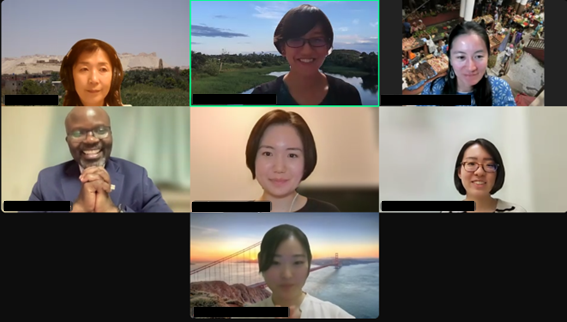
On May 13, an online seminar was held to introduce Sophia University’s research, classes, and practical programs targeting the African region, as well as outreach and exchange activities that students are conducting in Africa. The seminar was attended by about 70 participants, including high school and university students, as well as members of the general public and working adults. Eri Yamazaki, a researcher on the African region and a member of the SFDP Office, served as a moderator, while Mei Iida (2nd year, Department of Global Studies, Faculty of Global Studies), a member of the Africa Weeks Student Committee, served as a student moderator.
In the first part, three members of the Africa Weeks Student Committee introduced the classes they had attended and their projects. Ms. Iida highlighted the activities of her student organization, ASANTE PROJECT. She described their activities to support children attending kindergartens in Tanzania and how the members go there to discuss with the teachers and confirm the needs of the children while providing supplies and support for the construction of kindergartens.
In the latter half of the session, three faculty members involved in African studies took the podium in turn.
Professor Erina Iwasaki (Department of French Studies, Faculty of Foreign Studies), whose research focuses on North African socioeconomics, development and poverty, the family, and groundwater and oases, spoke about the fascinating aspects of North African studies. First, she introduced the idea of the Mediterranean Sea and the Sahara Desert regarded as “space of mobility” where people and goods come and go, and that “North Africa is a place of exchange rich in diversity. Then, referring to oases in the western desert of Egypt as an example, she explained that the lack of any water resources other than groundwater, due to not having any natural disasters such as typhoons, is an interesting setting to think about how human society cope with the natural environment. She also noted how civilization and technology have developed in this region, and mentioned how interesting it is that the lack of water resources leads to new wisdom.
Associate Professor Mikako Toda (Faculty of Global Studies), conducting research in ecological anthropology with an emphasis on firsthand observation in Cameroon and the Congo in central Africa, discussed her focus on regional research with an eye on people with disabilities. She also discussed her extended studies on the view toward people with disabilities in non-Western societies, the junction of the study of disability and cultural anthropology as well as gender studies, and the reconsideration of “care” in African hunter-gatherer societies.
Finally, Toussaint Kafarhire Murhula, a Jesuit Visiting Professor at Sophia University, took the podium and addressed three main topics. First, he introduced the African Studies Association of Africa, an academic organization of which he chairs, and talked about how researchers from Africa and abroad gather and engage in extensive research activities in the African region. He then talked about the diversity and charm of African culture and emphasized that the future of the world lies in Africa. He concluded by expressing his high expectations for African youth as a source of hope.
Working in Africa utilizing French Language Skill
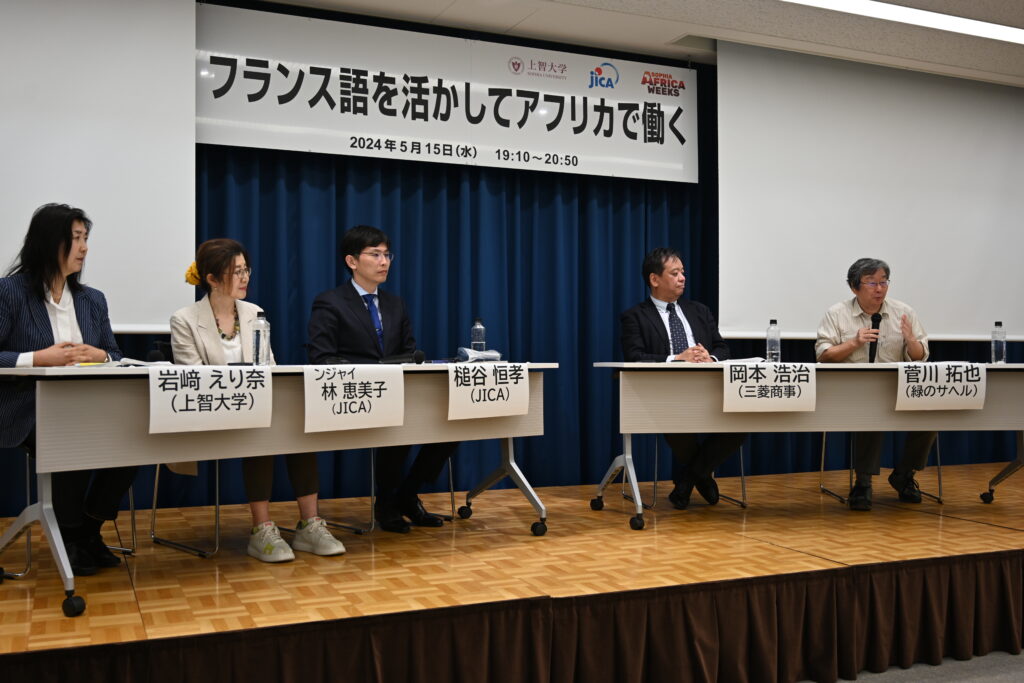
On December 15, a seminar was held mainly for high school and university students, with experts with work experience in Africa attending the event. This seminar was aimed to create opportunities for students seeking employment in Africa by making use of their French language skills. 126 people with high interest in working abroad attended the seminar.
At the beginning of the seminar, Mr. Shuhei Ueno, Deputy Director General, Africa Department, Japan International Cooperation Agency (JICA), gave an opening remark and expressed his high expectations for the seminar. Then, moderated by Professor Erina Iwasaki of the Department of French Studies in the Faculty of Foreign Studies, Ms. Emiko Njai Hayashi, Counselor, Procurement and Dispatch Operations Department of JICA, Mr. Tsunetaka Tsuchitani, specially appointed lecturer in the Faculty of Law at Kanagawa University and adjunct research assistant at the JICA Sadako Ogata Peace and Development Institute, Mr. Koji Okamoto, Deputy General Manager of Europe and the Middle East Office, Global Affairs Department, Mitsubishi Corporation and Mr. Takuya Sugawara, Deputy Manager, Middle East Division, NGO.
First, the speakers introduced their experiences in the region, outlining their project activities and how they came to work in Africa, accompanied by their photos. Mr. Sugawara shared his experience that his French brought him closer to people in both governments and tribes and explained that a minimum level of the language skills is necessary for long-term service in Africa. Mr. Okamoto spoke of the excitement of doing business in Africa, an area with such a rapid growth potential, offering tremendous opportunities and spoke of the advantages of working in the private sector, where opportunities to work in Africa tend to be offered regardless of one’s work experience. Mr. Tsuchiya introduced his own language learning method based on his learning of French once he was assigned to work in Africa and encouraged the audience to “study while having fun, and age is not a barrier to learning any language.” Mr. Njai Hayashi, who originally had no intention of working in Africa, shared the beauty of working in Africa, saying, “The environment where everyone is relaxed and not overly pressured allowed me to simply remain who I truly am.
The second half of the seminar consisted of a panel discussion in which the speakers answered questions from the audience, and the seminar concluded with a cheer from the speakers to the audience. After the seminar, there was time for exchange, during which many audiences showed enthusiasm to approach the speakers to ask questions with notebooks in their hands, and the seminar ended on a high note.
The Culture of Friendship Connected by Pleasantry (humor): The Art of Negotiating with Laughter in Cote d’Ivoire, Its Origins and History
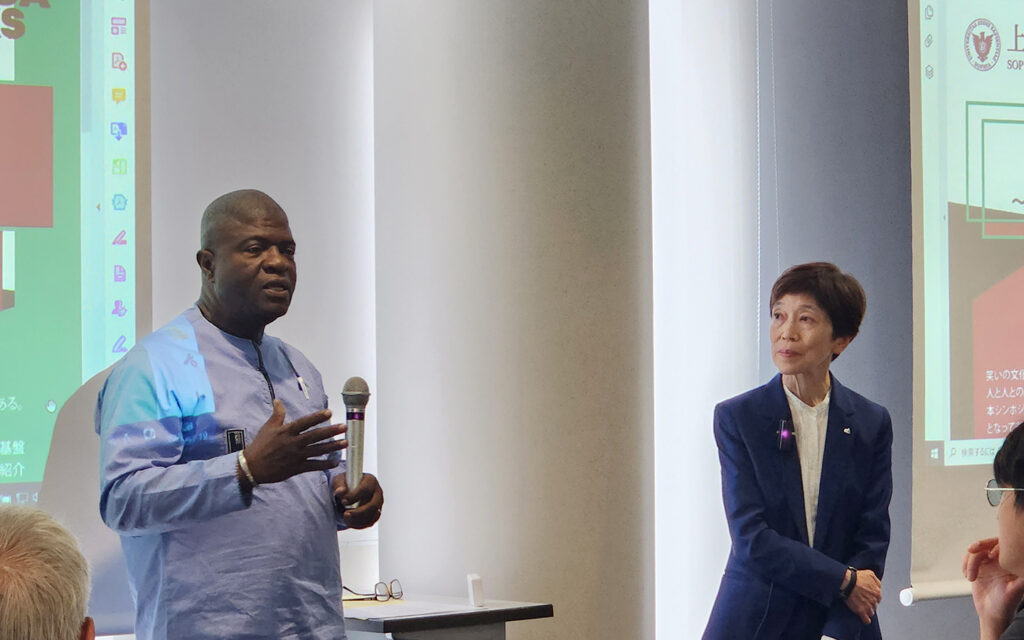
On the 19th, “The Culture of Friendship Connected by Pleasantry (humor): The Origin and History of the Negotiation Technique, the Art of Laughter in Cote d’Ivoire” was held at the Osaka Satellite Campus of Sophia University. Africa Weeks had previously been held only at the Yotsuya Campus, but this event was held in Osaka where the culture of “humor” and “laughter” is also rooted. The lecture focused on the role of “pleasantry” in overcoming ethnic conflicts and disputes in Cote d’Ivoire, and also introduced the current state of Japanese language education in Cote d’Ivoire as well as study abroad experiences of Sophia students who stayed in Cote d’Ivoire.
At the beginning of the lecture, Professor Atsuko Nagai of the Department of French Literature, Faculty of Humanities, introduced the University’s efforts to promote understanding of the African region through research of the region, enrichment of the study abroad program, and exchanges among students. Cote d’Ivoire and Japan have a long history of economic exchange, which temporarily ceased due to the civil war and economic stagnation in Japan, but in the last 10 years, exchange between the two countries has become active again. She expressed her hope that the two countries would not only focus on economic development but would also gain insights from the traditional culture of the African region, which has existed since pre-colonial times.
Professor Meke Meite, President of the University of San Pedro (Côte d’Ivoire), introduced the role of “humor” and its history with the country’s background. He showed that teasing and exchanging humors can neutralize and stabilize tensions and conflicts by allowing both sides to accept each other’s wit rather than being hostile. Professor Meite’s lecture was interpreted by Professor Nagai, and many questions were raised by the audience, making the lecture highly interactive.
African Oral Literature and the Modern Age
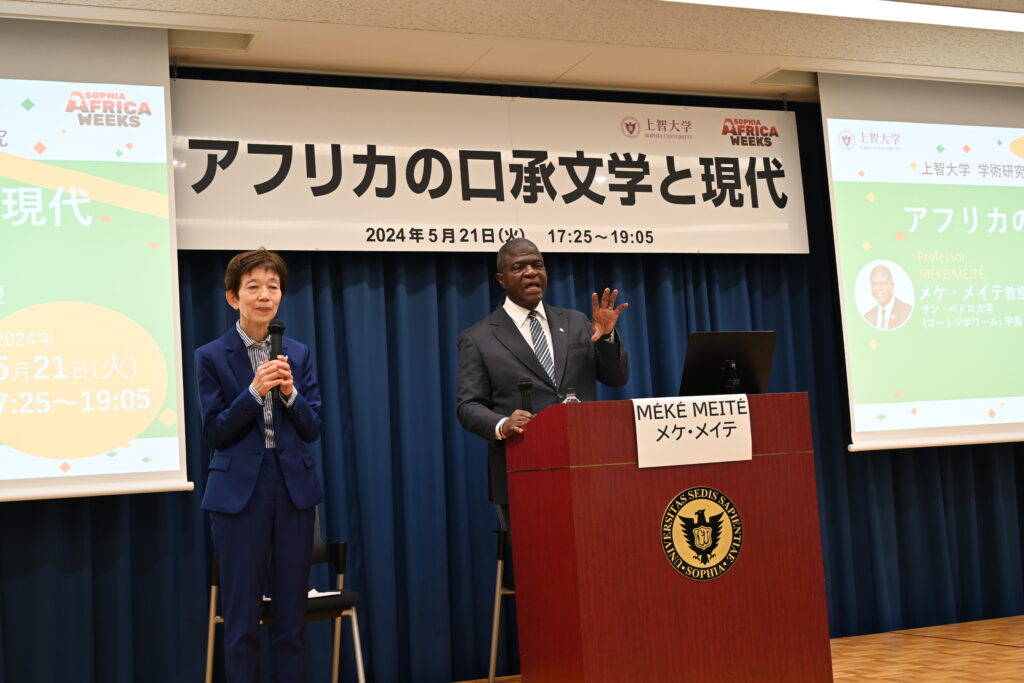
On April 21, Professor Meke Meite, President of Saint Pedro University in Cote d’Ivoire, was invited as a lecturer to speak on “Oral Literature in Africa and the Contemporary World. Interpretation provided by Professor Atsuko Nagai of the Department of French Literature in the Faculty of Humanities, about 60 people attended the lecture on the history, tradition, and existence of oral literature (i.e., literature passed down to future generations only through oral tradition), which has taken root in the lives of African people.
Professor Maite explained that oral literature includes a wide variety of forms of expression, ranging from those that convey faith, such as myths, to those that pass on knowledge and lessons, such as folk tales, proverbs, and poetry. Distinguished from written literature, oral literature has served to entertain, educate, and enhance social bonds.
There was a time when oral literature was considered outdated and viewed as a mere instrument to carry on the traditions of the past, whereas modern literature is seen as a symbol of progressive development. In reality, however, Professor Meite points out, oral literature is essential for the well-being and growth of a society.
Oral literature has always been the art of face-to-face communication and the way to pass on wisdom. And even in today’s society, where new technologies are being created one after another, oral literature will always respond to new ways of life, and will continue to reflect newly emerging values and traditions to transmit cultural richness.
During the Q&A session, questions such as “How will African oral literature evolve in the future with the development of the Internet and social networking services? ” to which Professor Meite responded with humor at times. This was a valuable occasion for students, researchers, and professionals to exchange views and opinions with experts of African literature.
Africa Day Commemorative Lecture
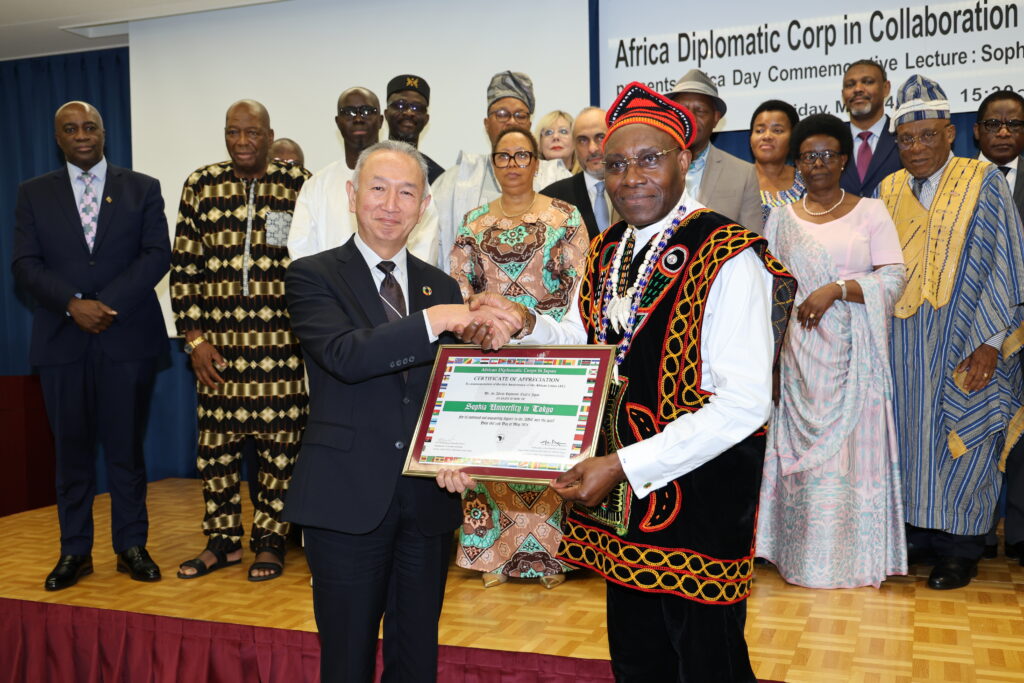
On May 24, the Africa Day Lecture was held to commemorate the founding day of the African Union (May 25).
In his opening remarks, Professor Yasuhiro Ueki of the Graduate School Master ‘s Program in International Cooperation Studies touched on the allure of Africa’s diverse cultures and developing economy, and emphasized the need for young people around the world having opportunities to learn from each other in order to understand the global society. He urged the audience to take advantage of this opportunity to gain a deeper understanding of the global society.
In the keynote speech, Mr. Lukumwena, Ambassador of the Democratic Republic of the Congo to Japan, presented an overview of Africa’s history, geography, and the African Union, as well as current issues related to education in Africa and the prospects hereafter. He also touched on the various issues facing Africa, the major changes needed to resolve these issues, and the future that is expected of Africa. Referring to the good relationship between Africa and Japan, he expressed his hope for the 2025 Tokyo International Conference on African Development (TICAD).
In the Q&A session held in the latter half of the session, a brief but lively, extended on topics from Japan’s support for Africa through TICAD, support from other African countries for the Sahel region, to the meaning of each country’s national costume design-related issues.
In closing, facilitator Professor Ueki expressed his hope that “Africa is a very young country. It is my hope that Africa will move forward throughout the 21st century,” and the event ended on a high note.
Later in the evening, an Africa Day reception was hosted by the African Diplomatic Corps in Tokyo (ADC) and attended by Mr. Masahiro Koumura, Parliamentary Vice-Minister for Foreign Affairs, Mr. Takeharu Yamanaka, Mayor of the City of Yokohama, and many other dignitaries and ambassadors from various countries. The venue was filled with energy as bands played and food from various countries was served. It was an evening that foreshadowed the further enrichment of the cordial relationship between Japan and Africa, as seen in the smiles all around the venue.
AFRI CONVERSE 2024
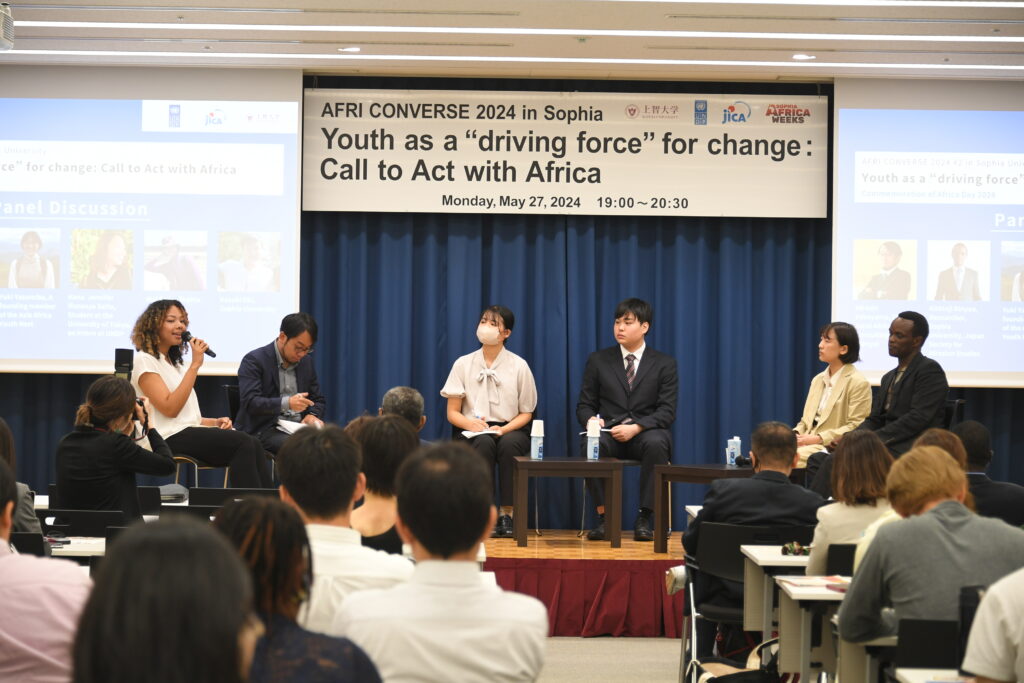
On the 27th, the Japan International Cooperation Agency (JICA) and the United Nations Development Programme (UNDP) jointly hosted the event “AFRI CONVERSE 2024 in Sophia” to discuss the future with Africa.
The event opened with a video greeting by Ms. Afuna Ezakonwa, UNDP Assistant to the President and Director of the Africa Bureau, and was followed by two Sophia University students who have visited African countries in recent years (Ms. Mai Saito, who traveled to Zimbabwe in March 2024, and Mr. Kazuki Oki, who visited Cote d’Ivoire in summer 2023 for a practical study abroad program). They shared their discoveries and learning in Africa.
Following Mr. Yokoyama, CEO of Axel Africa Corporation, moderated a panel discussion titled “A Call to Action” with three people who are working to connect Africa and Japan: Yuki Yasumiba, KINYUA Laban Kithinji, and Hanajienifuaifuonaia Saito. The panelists shared their reasons for starting their effort, what they have learned through their activities, and their upcoming career plans, and then discussed various possibilities for future collaboration.
The speakers gave the following advice regarding the involvement of Japanese youth in the activities: ” It is important to overcome stereotypes, as it leads to new opportunities, so anyone who wishes to know more about Africa must open themselves to the people around them free from preconceived ideas and get to know them just the way they are. If you know someone who is interested in Africa but cannot take a step forward to get involved, please make an approach.
To close the event, Mr. Shuhei Ueno, Deputy Director General, Africa Department, Japan International Cooperation Agency (JICA), announced the Mock African Union (MAU) to be held in Japan for the first time on August 23, and read a message from the Director General of the African Union Commission on behalf, stating the significance of the youth power in achieving the African Union’s long-term vision for African development, “Agenda 2063”.
Tanzania, A New Investment Frontier for Africa, and International Partnerships
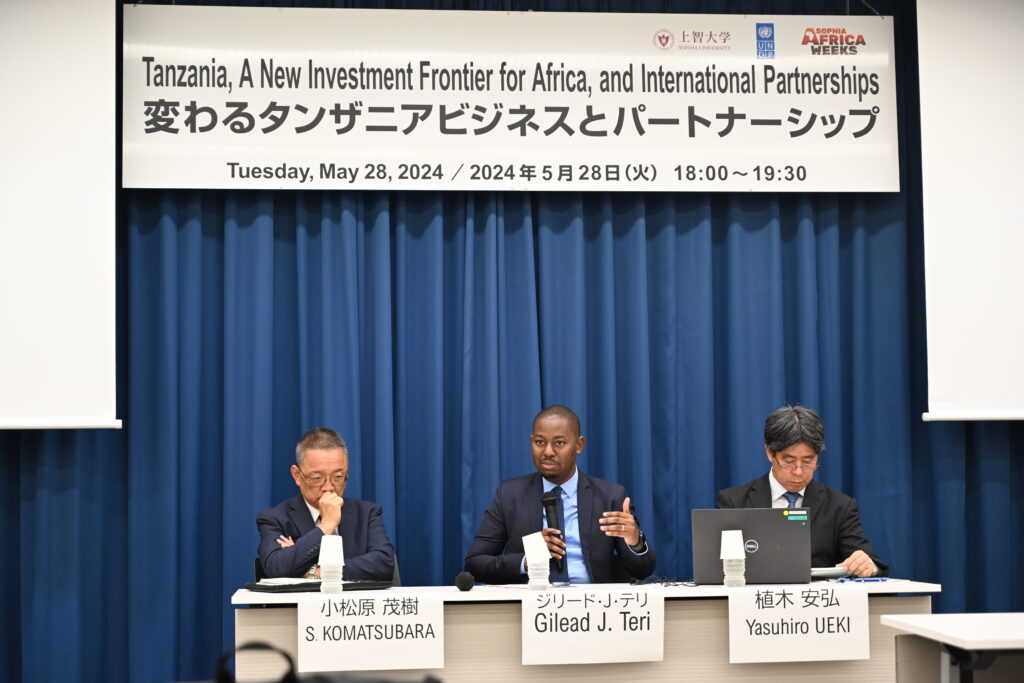
On the 28th, a seminar entitled “Changing Tanzanian Business and Partnerships” was held to exchange views on the current state of business in Tanzania, which continues to enjoy solid economic growth among East African countries, as well as future investment opportunities. The seminar was moderated by Professor Yasuhiro Ueki, Director of the Human Resource Center for International Cooperation, and was attended by approximately 80 participants, both in person and online.
Mr. Gilead J. Teri, Director General of the Tanzania Investment Center, took the podium for the keynote speech, introducing Tanzania’s political stability as well as its solid economic growth backed by its rich natural resources and geographical advantages. He also cited various incentives to attract investment and areas of investment where growth is expected, stating, “We hope to continue to build a strong partnership with Japan, which has a significant presence in the international economy.
Then Mr. Shigeki Komatsubara, UNDP Resident Representative in Tanzania, took the podium. He explained the significance of the Global South, the general term for emerging and developing countries in the Asian and African regions located in the southern hemisphere and presented data on the economic growth and investment opportunities in Tanzania and other African countries.
In closing, Professor Ueki spoke, “I have visited Africa many times during my previous posts at the United Nations and for academic engagements, and I believe that Africa is a continent that is full of potential for the future. I hope that you will become interested in Africa or Tanzania, which are bound to play an important role in the world economy going forward, and that you may experience its charms by actually visiting these countries.”
With Africa
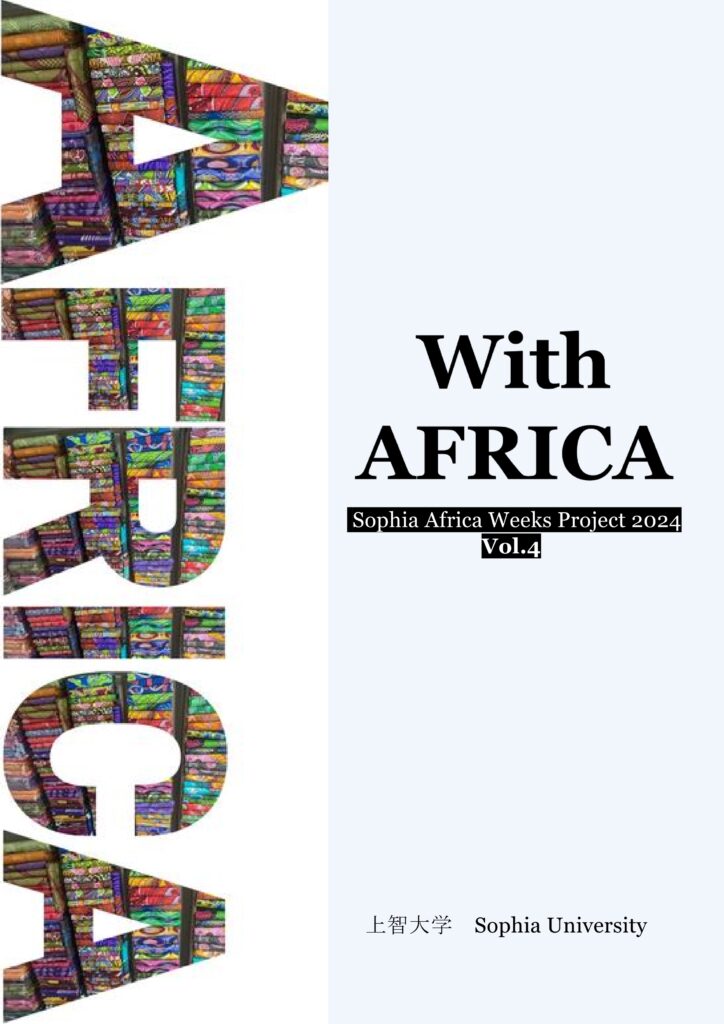
Student Magazine Project : “With Africa” “With AFRICA”, a 12-page magazine planned, reported, and produced voluntarily by students, is distributed at the Student Center, the Library, and the SFDP Promotion Office (1st floor of Building 1).